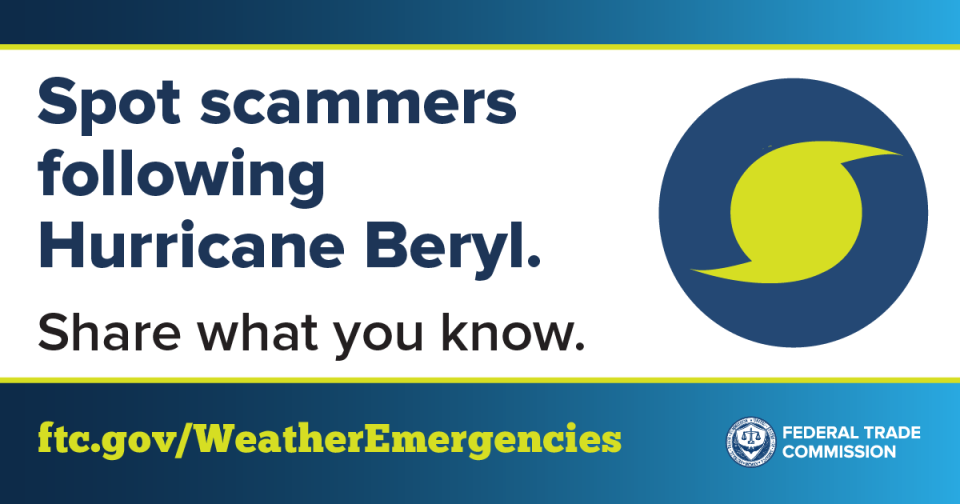If you live in the path of Hurricane Beryl as it moved through Texas, recovering is your number one priority right now. Unfortunately, scammers take advantage of situations like these to strike. Here's some information to help you spot and avoid the scams as you do your best to recover.
Scammers take advantage of weather emergencies and to try to trick you into thinking they’re there to help in some way. They pretend to be utility companies restoring power, workers making repairs, or even government agencies offering assistance — but it’s a lie. To avoid their tactics:
- Ask for identification to verify who you are dealing with. Scammers and unlicensed contractors often appear in recovery zones. If they refuse to show you identification or want cash up front, walk away.
- Never hire someone who shows up offering clean up or repair services but demands you pay cash or give them money in advance. Only scammers do that.
- Don’t pay to get government assistance. Anyone who wants money to help you qualify for FEMA or Small Business Administration funds, it’s a scam. Download the FEMA Mobile App to get alerts and information.
Check out more red flags to help you avoid scams after a natural disaster — and share this information with others so they can also spot the scams. If you suspect a scam, tell the FTC at ReportFraud.ftc.gov.


Everywhere you go there's Scam take advantage of the dire emergency situation. Fyi I'm one of the active animal activist "some of the Scams use animal welfare organizations to ask some donations from the consumers especially online. So if you're compassionate & kind you're willing to donate some money. On the end, they want to steal your own identity! Even my AIL policy is use for Fraud to steal money in AIL company by AIL employees customer service & ghost employee in WACO TX as well in DALLAS TX. And I chat with that person named Diana told me that her lawyer will always call me to avoid calling her about my steal money with my AIL policy.
That is true, I believe it . I still remember the year we got fire alert , and notified that we should leave the house, at that moment, a call coming that my personal informed is used by someone. He gave me the phone # to call them. I never has this kind of thing before, I did it. Of cause I will not share info with him. Now I know that is scammer!
Thanks Thanks...Very Good!
Brazil.
I live more than 800 miles from the nearest ocean. WHY would I care about hurricanes? STOP assuming that we all live near the coast...
In reply to I live more than 800 miles… by Bob Costitas
You are aware that this Hurricane went all the way to the Great Lakes?? All the way from Texas through land locked states??? Knowledge is power.